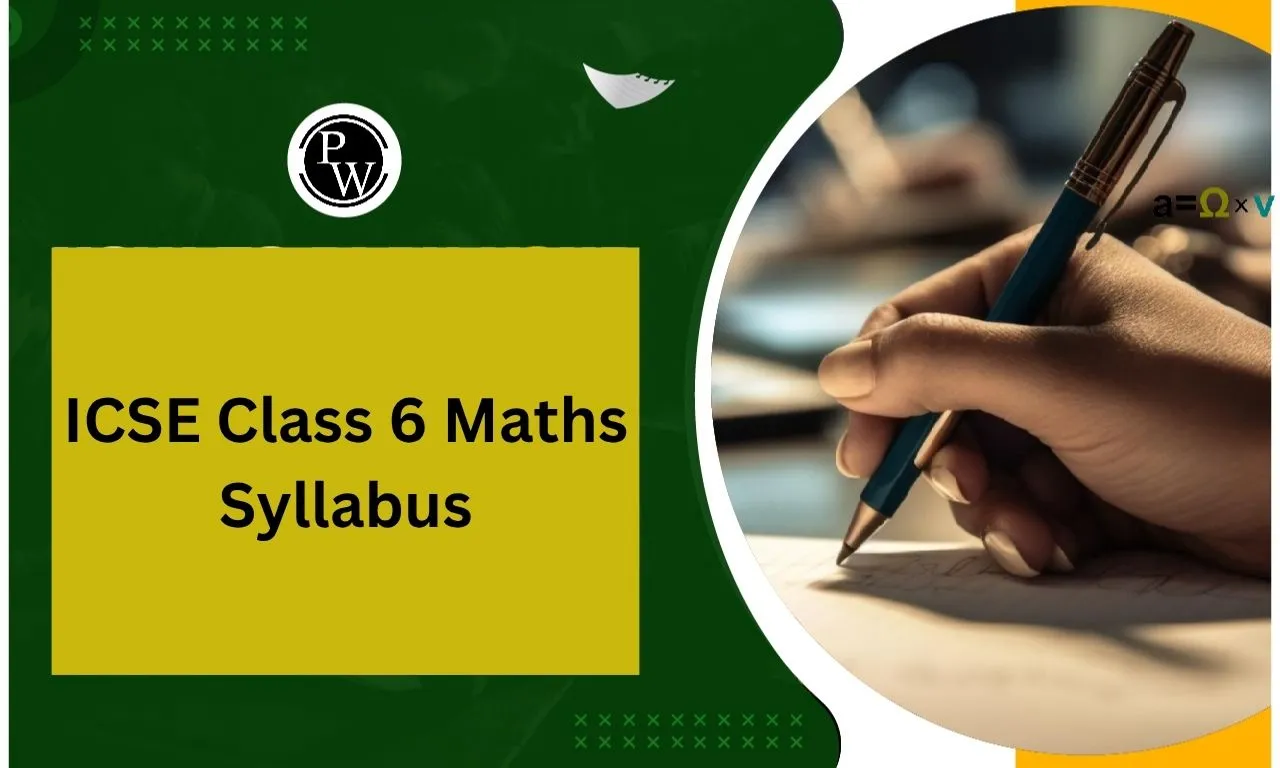The ICSE Class 6 Chemistry syllabus introduces students to the basics of matter, elements, compounds, and simple chemical changes. It is designed to build a strong foundation for higher classes and emphasizes observation, experimentation, and understanding chemical reactions.
The exam pattern usually includes objective-type questions, short answers, and application-based questions. Students are encouraged to refer to the latest syllabus and solve previous year papers to understand the type of questions asked and improve their exam readiness. Regular practice with sample papers based on the syllabus helps students gain confidence and score well in the final examination.
ICSE Class 6 Chemistry Syllabus 2025-26
The ICSE Class 6 Chemistry syllabus 2025-26 introduces students to foundational scientific concepts such as matter, elements, mixtures, and essential resources like air and water. It is designed to build curiosity and understanding through practical and theoretical learning. The exam covers all these topics, and solving previous year papers is recommended. Below is the detailed syllabus in tabular format:
|
ICSE Class 6 Chemistry Syllabus |
|
|
Chapter Number |
Chapter Name |
|
Chapter 1 |
Introduction to Chemistry |
|
Chapter 2 |
Matter |
|
Chapter 3 |
Elements, Compounds, Symbols and Formulae |
|
Chapter 4 |
Pure Substances and Mixtures; Separation of Mixtures |
|
Chapter 5 |
Air and Atmosphere |
|
Chapter 6 |
Water |
Detailed Overview of ICSE Class 6 Chemistry Syllabus
Here is a detailed overview of the ICSE Class 6 Chemistry syllabus:
Chapter 1: Introduction to Chemistry
This chapter familiarizes students with chemistry's meaning, importance, and role in daily life. It introduces the concept of a laboratory, basic apparatus, and safety rules for conducting experiments.
Chapter 2: Matter
Students learn about the definition and characteristics of matter. The chapter covers the three physical states—solid, liquid, and gas—along with their properties and interconversion through heating and cooling.
Chapter 3: Elements, Compounds, Symbols and Formulae
This chapter introduces the basic building blocks of all substances: elements and compounds. Students also learn about chemical symbols, the periodic table, and how to write and understand simple chemical formulae.
Chapter 4: Pure Substances and Mixtures; Separation of Mixtures
Students understand the difference between pure substances and mixtures. The chapter explains common separation techniques such as filtration, evaporation, and decantation used to separate components of mixtures.
Chapter 5: Air and Atmosphere
This chapter explores the composition and importance of air. It covers the concept of the atmosphere, properties of gases, and the role of oxygen, carbon dioxide, and nitrogen in supporting life and combustion.
Chapter 6: Water
Water as a vital resource is studied here—its sources, uses, and importance. The chapter also discusses physical properties of water, its states, the water cycle, and the concept of water purification.
ICSE Class 6 Chemistry Syllabus PDF 2025-26 Download
To help students and parents access the complete curriculum easily, we have provided the ICSE Class 6 Chemistry Syllabus in a downloadable PDF format.
This PDF includes all six chapters as per the latest syllabus, covering key topics such as matter, elements, air, water, and mixtures. It is useful for exam preparation, revision, and planning studies throughout the academic year. You can download the PDF from the link given below for quick reference and offline access.
ICSE Class 6 Biology Syllabus 2025-26
Study without using the internet
Benefits of Using the ICSE Class 6 Chemistry Syllabus
Here are the benefits of using the ICSE Class 6 Chemistry syllabus:
-
Strong Conceptual Foundation
The syllabus introduces students to core chemistry concepts like matter, elements, and mixtures, building a solid base for higher classes. -
Focus on Practical Learning
It encourages observation and experimentation through lab activities, helping students relate theoretical concepts to real-world applications. -
Systematic and Structured Learning
Each chapter follows a logical flow—from basic definitions to complex ideas—making it easier for students to grasp and retain knowledge. -
Introduction to Scientific Thinking
The syllabus promotes analytical and inquiry-based thinking by teaching students how to separate mixtures, identify substances, and understand changes in states of matter. -
Exam-Oriented Preparation
The ICSE format aligns the syllabus with the exam pattern, allowing students to prepare effectively using textbook exercises and previous year question papers. -
Early Exposure to Symbolic Language
Topics like chemical symbols and formulae develop familiarity with scientific notation, preparing students for advanced chemistry topics later on.
ICSE Class 6 Chemistry Syllabus FAQs
What is the focus of the ICSE Class 6 Chemistry syllabus?
How many chapters are there in Class 6 Chemistry ICSE?
Is practical learning included in the syllabus?
Are chemical symbols and formulae taught in Class 6?



